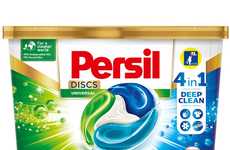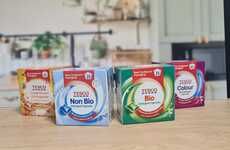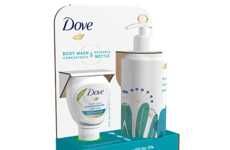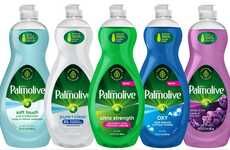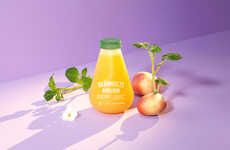
Seepje Makes New Laundry Detergent Bottles from Old Milk Packaging
Laura McQuarrie — December 13, 2017 — Eco
References: seepje.nl & thedieline
'Seepje' creates sustainable laundry detergent packaging that makes the most of repurposed waste.
Seepje's laundry product was inspired by the way in which women in Nepal use the empty shells of the Apindus fruit to do their laundry. As such, Apindus shells are the main ingredient for the brand's detergents.
In order to package the product in a way that captures the spirit of the brand's values, FLEX/design opted to repurpose post-consumer waste from HDPE milk bottles. This detail is reflected on the bottom of the packaging. To help consumers with the recycling process, the remainder of Seepje's packaging takes the form of a sleeve that can easily be separated from the main plastic body.
Seepje's laundry product was inspired by the way in which women in Nepal use the empty shells of the Apindus fruit to do their laundry. As such, Apindus shells are the main ingredient for the brand's detergents.
In order to package the product in a way that captures the spirit of the brand's values, FLEX/design opted to repurpose post-consumer waste from HDPE milk bottles. This detail is reflected on the bottom of the packaging. To help consumers with the recycling process, the remainder of Seepje's packaging takes the form of a sleeve that can easily be separated from the main plastic body.
Trend Themes
1. Sustainable Packaging - There is an opportunity for businesses to create sustainable packaging by repurposing waste and incorporating it into their products.
2. Alternative Ingredients - Brands can incorporate alternative ingredients such as Apindus shells to create sustainable products and reduce waste.
3. Circular Economy - There is potential for businesses to adopt circular economy principles and use post-consumer waste as a resource in their production processes.
Industry Implications
1. Cleaning Products - Cleaning product companies can develop sustainable packaging and incorporate alternative ingredients to appeal to eco-conscious consumers.
2. Manufacturing - Manufacturers can adopt circular economy principles and use post-consumer waste as a resource in their production processes, reducing waste and promoting sustainability.
3. Retail - Retailers can prioritize stocking sustainable products and highlight brands that prioritize sustainability in their packaging and ingredient choices.
3.8
Score
Popularity
Activity
Freshness



